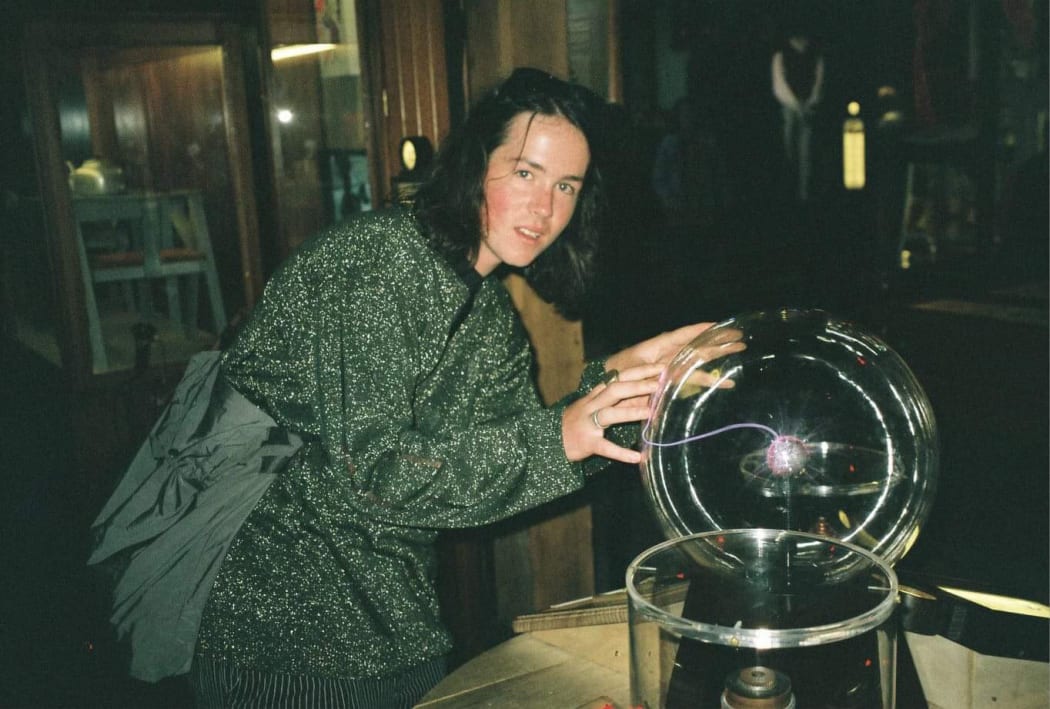Tony Stamp inspects the first album in 18 years from UK synth-pop heavyweights Tears For Fears, an acid jazz-tinged EP by teenage Wellington producer Benny Salvador, and the latest long-player from super-prolific Christchurch fuzz-pop maestro Blair Parkes.
The Tipping Point by Tears For Fears

Tears For Fears (Curt Smith & Roland Orzabal) Photo: Frank-Ockenfels
In the heyday of music television, the British pop outfit Tears For Fears loomed large. Looking back, it’s interesting to note that’s largely thanks to just a few songs. They’re one of those bands that I liked as a small child, and despite the pomposity I’ve come to associate with songs like ‘Shout’ and ‘Everybody Wants to Rule the World’, I have a fondness for their music that resides in my bones.
They’ve just released a seventh album - their first in eighteen years. It was brought on in part by tragedy, but also by the band simply wanting to keep existing, and not rest on their laurels. It shows they haven’t lost their knack for grandeur or memorable pop hooks.
For a while Tears For Fears had just one member - Roland Orzabal continued under the name as a solo project, after he and Curt Smith had an acrimonious split. Going back to look at some of the things Orzabal said about Smith in the press, it’s amazing they got back together at all, but in 2004 put out Everybody Loves A Happy Ending.
They’ve known each other since they were teenagers in the 1970s, and reading some of the things they say about each other now (both at the age of 60) is quite touching.
In 2014 they released a trio of cover versions of songs originally by Arcade Fire, Animal Collective and Hot Chip - a sign that they had an eye on younger bands, and that they wanted to stay relevant.
Their management wanted the same and paired them up with a series of younger pop writers in the sessions for this album. It was, according to Orzabal, an attempt to bring them “kicking and screaming into the modern world”.
Over time the pair grew to dislike those tracks, which they say felt like "attempts at hit singles". So they changed record label, changed management, and wrote a bunch of new songs.
In 2017 Roland Orzabal lost his wife of 35 years, Caroline. Her death inspired the title track of this album The Tipping Point, and while Orzabal and Smith had already reconciled, the tragedy brought them closer together. Curt had also been good friends with her.
They’re both open about using these emotions in writing the album, but a side effect according to Orzabal was increased cultural awareness. He said, “The trauma of losing your wife makes you raw. And in that rawness, I certainly started to get a sense of what was going on culturally”.
To that end, there are references here to Black Lives Matter, the patriarchy and government surveillance.
Musically, it was when the pair sat down with two acoustic guitars that they had the album’s creative epiphany. The song they wrote, ‘No Small Thing’, begins like a folk ballad before the trademark Tears For Fears pomp takes over.
The one collaboration that survived those early sessions is the track ‘My Demons’, co-written by Sacha Skarbeck, who’s also written with Miley Cyrus and Adele. This is surprising because it’s the song that feels the most dated - beginning like the Doctor Who theme, and continuing in an unbridled way that feels cliched, but genuine at the same time.
In researching this review, I discovered Tears For Fears were a much more interesting band than I’d ever realised. For example, I didn’t know the lyrics on their first albums were inspired by the psychologist Arthur Janov, whose ‘primal therapy’ gave the band its name. His most famous patient was John Lennon.
Not coincidentally, there’s a lyric here about being ‘between The Beatles and The Stones’, and in terms of legacy, that might be overselling it. The Tipping Point definitely sags about halfway through, but most of its songs are fine electro-pop numbers. I’m certainly biassed, but I’m also pleasantly surprised that my childhood favourites released something this good over thirty years after their heyday.
Family Fruit by Benny Salvador

Benny Salvador Photo: supplied
A few years ago some of the music fiends I follow on social media began loudly hailing the talent of a teenage Wellington producer making his spin on Detroit techno. Looking at the credits of his debut EP, there were some familiar names, like saxophonist Lucien Johnson, drummer Riki Gooch, and mixing courtesy of Mu from Fat Freddy’s Drop.
Eventually, I learned that this producer, Benny Salvador, is the son of Joe ‘Hopepa’ Lindsay from Fat Freddy’s, and while there’s certainly something to be said for having some of the country’s most talented musicians at your disposal, it’s also obvious that a sense of musical innovation runs in the family.
Rejoining Benny on this new EP Family Fruit are Riki Gooch on drums and Lucien Johnson on sax, along with Phoenix Foundation’s Will Ricketts on vibraphone, and Sam Lindsay, who plays with Joe Lindsay in The Yoots. Sam is Benny’s uncle, but all the players here are credited as ‘uncle’, apart from one that just says ‘dad’.
Bass is split between dad and Gooch, so I’m not sure which is supplying the slap groove on the track ‘Duck Rice’, but it’s certainly tasty.
And tasty is the name of the game here - each song is named after a foodstuff, although that rule gets hazy, like the opener ‘A Bunch of Eggs’. I wondered if that might be an affectionate term for the people performing.
Benny’s second EP is called Change of Depth, and on that one, he’s the only musician. It’s a stripped-back set with a techno palette and a hint of jazz.
Paired with these musicians on his third, that second aspect comes to the fore. On ‘Laksa 1 & 2’, Gooch’s nimble drumming brings to mind the way local artists like The New Loungehead paired acid jazz with drum n bass when that genre was in its ascendence.
Family Fruit is specifically described as ‘a condensation of lockdown jams recorded at home throughout 2020 & 2021’. Benny is credited with synths, flute, and drum machines, but I bet he did a lot of editing too, cherry-picking the best moments.
The name is a cheeky acknowledgement of family as well as food, and the presence of all these uncles pairs nicely with the name of Benny Salvador’s label Aunty Records.
But the EP’s main strength is its sense of spontaneity and exploration. The final track ‘Schnauzy’ turns to krautrock for inspiration, and I like that three EPs in, Benny keeps trying his hand at different genres, investing them all with his particular sense of fun.
Over Bored by Blair Parkes

Blair Parkes Photo: supplied
Delving into the catalogue of Christchurch musician Blair Parkes is a downright intimidating prospect. He’s been putting out music in various bands since the late eighties, and sporadic solo releases since the nineties. He’s even written a book about songwriting.
After a period of making electro-pop in the 2000s, and then embracing experimental works, he returned to the bosom of indie rock: which is good news for fans of fuzzed-out, melodic guitar pop.
When Blair Parkes appeared on NZ Live in 2019 his catalogue listed 38 singles, EPs and albums, and there have been nine more since then. The bio on his Bandcamp page lists 13 bands he’s been in.
The first of those was All Fall Down, his high school outfit, who were signed to Flying Nun, and released one EP before disbanding.
Parkes certainly seems like a restless soul musically, but he keeps coming back to petite pop hooks. ‘Overboard’ has a sense of grandeur and a whiff of Britpop, but tracks like ‘No Plans’ feel like classic Flying Nun to me - sweet, but smudged with a healthy layer of fuzz.
Despite his varied back catalogue, Parks has kept the same collaborators since his 2019 album Liveable City - Miss Mercury on vocals, and Ryan Fisherman (himself a fine singer-songwriter) on drums. In 2020 Marcus Thomas joined on bass, and on this album, they sound particularly locked-in, a solid foundation for all those catchy moments.
I was talking to a musician recently who makes a point of leaving any imperfections in their music, as opposed to fixing them digitally - I know a lot of live players feel this way, and I suspect Parkes does too.
‘Time Stopped’ has a bit of swagger to it, and some 50s harmonies, but I appreciate the way Parkes and Miss Mercury’s vocals aren’t totally in sync. There’s a pleasant amount of dissonance that reminds you these are real people.
In 1995 Flying Nun released a compilation called Abbasolutely, which featured their roster covering Abba songs. It showed that under the fuzz and lower fidelity, the Swedish pop tunes weren’t that different to the ones the Nun bands were writing.
This album definitely falls into that category. Blair Parkes is writing songs as good as any in his 30+ year career, all of them relatively pretty, and imbued with a sense of vulnerability under the noisy veneer.

